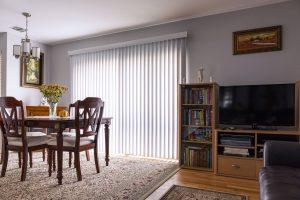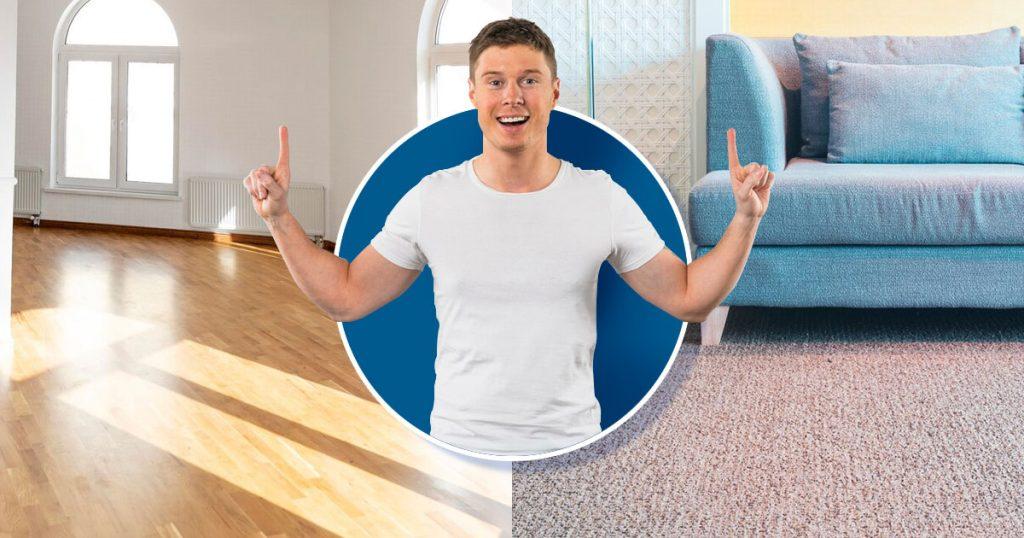When selecting flooring for your home, one of the most important decisions you’ll have to make is whether to go with carpet or hardwood. Both alternatives have pros and cons, so you should examine your lifestyle, budget, and aesthetic preferences.
Carpet vs. Hardwood: Getting To Know Each Flooring
Carpet flooring is a soft, fabric-based material laid out and secured on the floor. It’s cozy and warm, and it helps reduce noise. You can find carpet flooring in many colors, patterns, and textures, making it a flexible choice for various spaces. However, cleaning carpet can be more challenging than cleaning hard floors, and it might wear out faster, needing replacement sooner.

Hardwood flooring, on the other hand, is composed of solid woods such as oak or cherry. It is installed by connecting the wood planks to the floor. Hardwood flooring is a long-lasting and valuable addition to any home. They are available in various finishes and can be sanded and refinished to increase their durability. However, hardwood floors can be expensive and require more maintenance.

Hardwood vs. Carpet: The Difference
Here’s a comparison of hardwood and carpet flooring:
Appearance
Carpet:
- Offers a wide variety of colors, textures, and feels.
- Soft in appearance, providing a gentle, cozy look to a room.
Hardwood:
- It is recognizable for its natural wood-tone colors and appealing grain patterns.
- Creates a bold statement with its firm, natural look.
Water and Heat Resistance
Carpet:
- It is resistant to water damage but can develop mold if water seeps through.
- Heat can easily cause damage, such as when burning cigarettes or hot pots.
Hardwood:
- Not recommended in wet areas or against concrete slabs with ground moisture.
- Intense heat can leave markings, although moderate scorch marks can be sanded out.
Care and Cleaning
Carpet:
- It needs frequent vacuuming and stain removal, but some stains may be permanent.
- It is considered difficult to fully clean due to trapped dust, micro-bacteria, and permanent stains.
Hardwood:
- It requires less frequent cleaning effort and can be sanded and refinished to remove wear.
- Surface varnish should be reapplied every few years to maintain its appearance.
Durability and Maintenance
Carpet:
- It needs frequent replacement, typically lasting about a decade.
- It requires occasional deep cleaning to extend its life.
Hardwood:
- With careful maintenance, it can last for decades and be refinished several times.
- Some higher-end materials can last for generations.
Installation
Carpet:
- It involves attaching the underlayment, stretching, and trimming.
- DIY installation is uncommon due to its complexities.
Hardwood:
- Installed by laying individual rows of boards and nailing them to the joists.
- Prefinished at the factory in most cases, requiring professional installation.
Cost
Carpet:
- Generally, it is less expensive upfront, but it needs more frequent replacement.
- Costs vary greatly based on quality and material.
Hardwood:
- It costs more initially but can last longer with proper care.
- It adds value to a home and is considered a long-term investment.
Lifespan
Carpet:
- Typically, it needs replacing every 10 years or less.
- Lifespan varies according to quality and upkeep.
Hardwood:
- It can last over 100 years with proper maintenance.
- Adds prestige and value to a home.
Sizes
Carpet:
- It comes in rolls of various lengths, cut to fit the space.
Hardwood:
- Sold in 48-inch-long boards of different widths.
- Engineered hardwood offers an even greater variety of sizes.
Resale Value
Carpet:
- It adds less real estate value compared to hardwood flooring.
- New carpeting can be seen as an improvement over old flooring.
Hardwood:
- It adds more value to a home and is seen as a premium feature.
Comfort and Sound
Carpet:
- Soft, warm, and comfortable underfoot.
- It offers good sound insulation, making it quieter than hardwood.
Hardwood:
- It can be loud, especially on upper levels.
- Easier to clean and may be a better choice for allergy sufferers.
Environmental Impact
Carpet:
- Produced primarily from processed petroleum products, which are not natural.
- It may release volatile organic compounds (VOCs), which can contribute to indoor air pollution.
- Frequently constructed with synthetic materials that are not biodegradable.
- The production process can produce waste and pollution.
- Requires regular replacement, resulting in increased waste in landfills.
Hardwood:
- Natural material derived from trees that may be planted and replenished.
- Requires responsible sourcing to ensure eco-friendliness.
Wood Flooring vs. Carpet: Which is better?
Your preferences and needs will determine whether you choose carpet or hardwood flooring. Here are some key considerations to help you decide:
The carpet may be better if:
- You prefer a softer, warmer feel underfoot.
- Comfort and noise reduction are vital to you.
- You want a flooring option that is generally less expensive upfront.
- You prefer a variety of colors, textures, and patterns.
Hardwood may be better if:
- You prefer a more elegant and timeless look.
- You want a durable flooring option that can last for decades.
- You prefer a flooring option that is easier to clean and maintain.
- You want to boost the resale value of your home.
Ultimately, the best choice depends on your priorities and what you value most in a flooring material.
Is carpet better than hardwood?
The choice between carpet and hardwood flooring depends on various factors, such as personal preferences, lifestyle, budget, and environmental considerations. Hardwood flooring has a timeless, elegant appearance and may last decades with proper maintenance, making it an excellent long-term investment. On the other hand, carpet provides a soft, cozy feel and is generally more affordable upfront, but it may need replacing more frequently and can trap allergens. Finally, what you value most in flooring materials will determine the best option.
